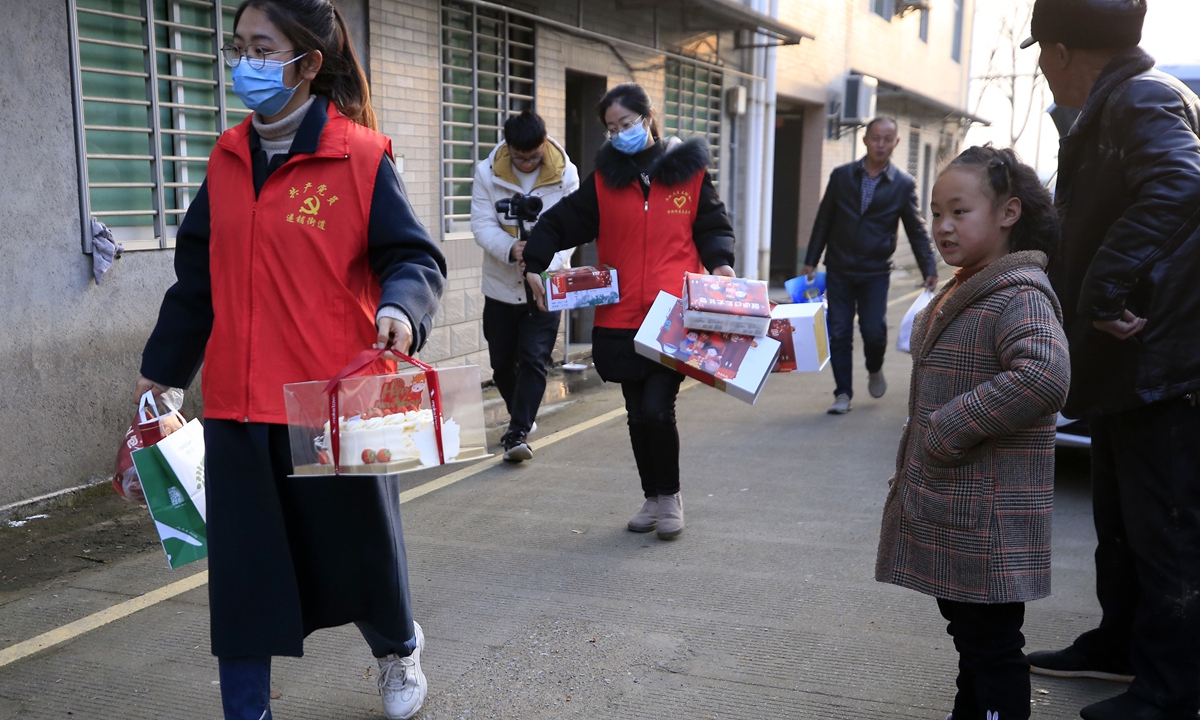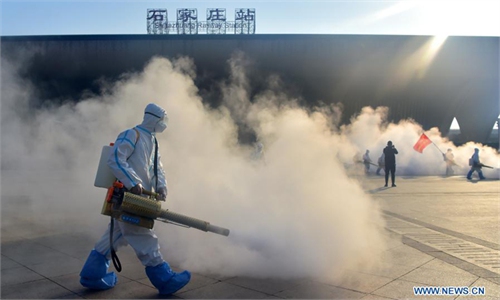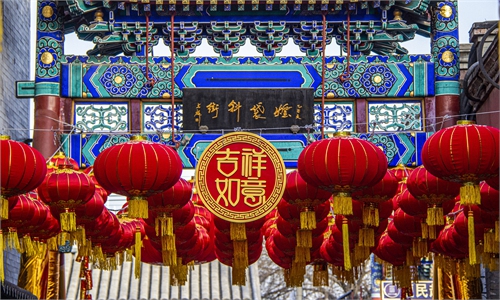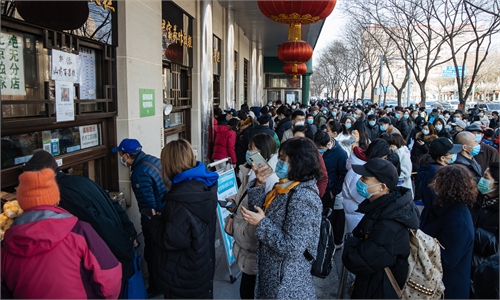
A civil servant delivers gift packages for workers who chose to stay at the city where they work during the Spring Festival holidays in Anji, East China's Zhejiang Province on February 2. Yang Hui/GT
As the Chinese authorities encourage people to stay put over the Spring Festival holidays to reduce the risk of an infection spike, the country's usual massive Chunyun or the Spring Festival travel rush has disappeared, which is replaced by bustling scenes of consumers across the country rushing to local supermarkets and online shopping platforms to stock up on holiday goods, offering a vivid testament to the country's economic revival.
Amid the policy suggesting people stay put in their working cities for the week-long holidays, data from online shopping platforms showed that they are gearing up for the holiday. Deliverymen who choose to stay in metropolises including Beijing and Shanghai are ready for a busy holiday.
On a chilly Tuesday morning ahead of the Spring Festival, when Beijing just woke up in a warm blanket of a rosy dawn, a group of deliverymen have been laboring for an hour sorting parcels at an express outlet in Jinzhan West, a village about a 40-minute-drive from Beijing's CBD.
Entering the yard of the outlet, a banner reading "Compared with being under quarantine at home, it's better to stay put making more money," came into sight. That's a slogan domestic express delivery firm Yunda Express uses to encourage employees to work as usual for delivery needs during the seven-day holiday period.
Tao Mingqi, a 21-year-old from Fushun, Northeast China's Liaoning Province, is one of the 20 some employees that chose to stay put to handle the exploding number of parcels.
"Recently, I generally get up at around 5:30 am and then walk 15 minutes to the outlet to start a day's work," Tao told the Global Times, noting that he may not finish his work until 9 pm on Tuesday because a colleague forgot to take a nucleic acid test and couldn't come to work, so he has to cover part of his colleague's job.
He said that he delivers about 300 parcels a day, and the overall number of parcels at the outlet increases day by day with the approaching Spring Festival when online shopping surges. Meanwhile, Yunda recently became a partner of leading e-commerce site Pinduoduo's 2021 online shopping festival, which means the courier will see a further increase in business.

Online campaign of special purchases for 2021 Spring Festival Infographic: Deng Zijun and Chen Xia/GT
"I had planned to return to my hometown this Spring Festival since I didn't go back last year, but I eventually decided to stay put as the authorities have called on us to do so," Tao said.
He said that the company offers 200 yuan ($30.96) a day as well as 0.5-1 yuan bonus per parcel during the Spring Festival as a reward. Meanwhile, the colleagues will have dinner together on the eve of the Spring Festival as a family, he said.
"It's my parents who I feel sorry for," Tao said while tweeting his thumbs in a pair of worn-out gloves.
"When I told them that I couldn't get back home, I can feel their sense of loss though they tried to hide their feelings. My mother unreluctantly smiles and repeatedly tells me to wear more clothes and mind traffic while driving," he said, adding that he sent some special local products back to his parents.
"Thinking that I could earn extra of over 5,000 yuan while contributing to the national anti-virus campaign makes me feel that my choice is worthwhile," Tao said. He said he plans to take two or three days leave to visit his parents after the end of the outbreak.
Between January 20 and February 3, the country's total number of parcels grew 28.94 percent year-on-year, with the figure reaching a peak on February 3 to 57 percent and expected to maintain a high-level over the Chinese New Year holidays, data from the State Post Bureau showed.
New Year's Eve dinner online
The policy to stay put in China to reduce high population mobility is also expected to bring revival to restaurants in cosmopolitan cities, which also stimulated the need for on-demand delivery and take-out services. Data from the Ministry of Commerce showed that sales of groceries for New Year's Eve dinner increased by 96 percent year-on-year since January 20.
Wang Xiaopeng, a 30-year-old deliveryman on the online take-out platform Eleme.com from North China's Shanxi Province, decided to stay in Beijing during the Spring Festival holidays - the first time he did so considering the virus containment measures.
"If I go back home, I need to stay at home to self-isolate. I don't want to disturb or worry other people. My parents also suggested staying put in Beijing during the festival," Wang told the Global Times.
Sending around 40 meals to customers per day in eastern Beijing, Wang's lunch comes late at about 2 pm as the lunch hour is a mad dash for deliverymen who usually come from small towns for better-off lives in big cities.
Working hard for four months without a day break, Wang hoped he could take some rest on New Year's Eve. "My roommates and I have prepared hotpot seasoning and beer for New Year's Eve, but if there are take-out orders, I will accept them."
To encourage the normal operation of businesses for the holiday, at least 90 cities have released incentives from red envelopes to rental cuts and vaccination priorities, media reports said.
For example, Yiwu in East China's Zhejiang Province - known as the "world's supermarket for small commodities" - announced in early January that barbers, auto repair shops and other businesses can apply for subsidies if they operate for a certain period of time during the holiday, with subsidies of 25 yuan per square meter and no less than 2,000 yuan per firm, according to the document released by Yiwu Fabu, the city's official social media account.
"This year, many Chinese people will celebrate the New Year in a different way with the 'stay in place' regulations; but that will not affect spending, because there are also new ways of shopping," Cao Heping, a professor at the School of Economics at Peking University, told the Global Times on Wednesday, noting that overall consumption will be robust this year driven by online sales.




